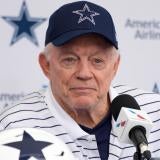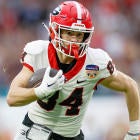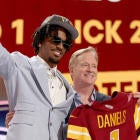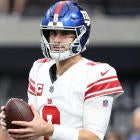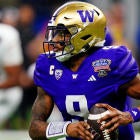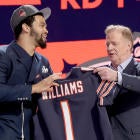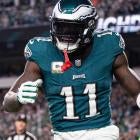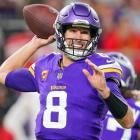
IRVING, Texas -- Several NFL team owners took offense Wednesday at league meetings when NFL executive vice president of football operations Troy Vincent referred to the NFL scouting combine as having characteristics of a "slave auction," multiple people present in the room told CBS Sports.
Vincent spoke to ownership Wednesday morning, announcing changes to the combine that would involve a less tedious medical evaluation process and a closer look at questions teams ask of draft prospects. The combine and other pre-draft evaluations have been criticized for what some consider dehumanizing methods of getting information about players.
"We just feel like the overall experience, talking to the players, we can be better in that particular aspect," Vincent told media later in the day. "So there was, I would say, a good discussion around what that looks like, where we could be, keeping in mind that the combine is the player's first experience with the National Football League, and in that experience, there has to be dignity.
"It's a great opportunity for the young men, but there has to be some form of dignity and level of dignity and respect as they go through that process. That was the overall theme around our combine [discussion.]"
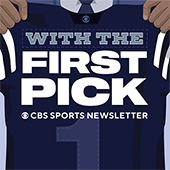
With The First Pick Newsletter
With The First Pick Newsletter
Prepare for the upcoming NFL Draft with the day’s big stories + mock drafts, big board updates and more.
Thanks for signing up!
Keep an eye on your inbox.
Sorry!
There was an error processing your subscription.
Sources within the ownership meeting revealed details of what Vincent said among team owners that included the reference to a slave auction. In the meeting, Vincent's comments drew an immediate response from Atlanta Falcons owner Arthur Blank, who stood up and registered his offense, according to sources. Blank, who has a strong record on diversity and inclusion over his two decades in the NFL, took umbrage with the idea that he was either taking part in or helping to prop up an event that could be considered racist.
Cowboys owner Jerry Jones followed Blank on the microphone. According to sources, Jones talked about the "privilege" of playing in the NFL. (A Cowboys spokesman said Jones didn't say "privilege" but instead said "opportunity.") He noted how many thousands of college football players there are, how only roughly 300 get invited to the combine and how even fewer get drafted.
Steelers owner Art Rooney II followed up by noting that the teams need the necessary information at the combine to make informed decisions, according to sources. Rooney, who is chairman of the NFL Diversity, Equity and Inclusion Committee that brought its coach and executive diversity accelerator program to these meetings, declined to comment on the record about the meeting.
Then Bills owner Terry Pegula took to the microphone to make a point that confused many in the room. According to sources, Pegula didn't condone the combine weigh-ins (which aren't televised) but seemed to play a devil's advocate role that it's ultimately what people want to see.
He then tried to bridge football with women's tennis, the sport of his daughter, Jessica, who is ranked No. 3 in the world. The Bills owner appeared to bemoan the sometimes-revealing outfits that he said women tennis players are encouraged to wear. Some sources construed his comments to mean that sports all have some level of exploitation. Another source simply called them "incoherent." The conversation came to an end shortly after Pegula's confusing comments.
The conversation was not wholly new, as the combine process has been discussed and changed over time. But the tone of this discussion was noteworthy. Vincent, a former Pro Bowler as a player, has been with the NFL since 2014 as a leader in football operations, and he has addressed topics such as kneeling during the national anthem and coaching hiring discrepancies while serving as, in words he used in an interview with The Root, a "bridge builder" from inside the league office.
Vincent took up the topic of the combine as the entire predraft process has been overhauled over in recent years. The league no longer issues the Wonderlic test, an aptitude exam that has been criticized for its bias and relevancy. Before that, the Senior Bowl and Shrine Bowl did away with public measurements and weigh-ins.
The combine is crucial to NFL teams for medical information and player interviews. The league has already tweaked the schedule for next year's combine, as CBS Sports first reported two weeks ago, after consulting with players and their representation on better practices moving forward.
"The biggest thing that the players have raised over time is, 'I come in, I'm fired up for this, and I have to go and get an additional medical test. And I'm sitting in a hospital waiting for four or five hours on an MRI machine. I have to have multiple meetings about the same type of injury,'" NFL commissioner Roger Goodell said Wednesday. "For us, it's really about trying to improve that experience. And they talk about lack of sleep because they get in at 1 o'clock in the morning and then have to be back at 5, and then they have to perform on the field. And it's an important element for them because they want to perform at the highest level.
"I think all of that goes into why we want to make that experience better for the players coming, making sure that they have the best ability to perform. And make sure that the clubs obviously get that information, but they have to get that in an appropriate and professional way."
The medical exams can take an entire day for players. They go by position groups to different examination rooms and hospitals throughout the day, being checked by doctors across many teams. Hundreds of scans and MRIs of the players are taken by doctors over the week.
The league doesn't seem to find all the scans, poking, and prodding necessary. Chief medical doctor Allen Sills gave an example of a college player who may have had a knee injury months before the combine, with a post-op MRI already completed. Sills said doctors could retrieve that MRI rather than making the player take another in Indianapolis.
The combine has also been known for the questions teams ask prospects. They go from strange and bizarre to inappropriate and, technically, illegal in a job interview. Cornerback Eli Apple said in 2016 a team asked him if he liked men. Former NFL defensive end Obum Gwacham said in 2015 a team asked him when he lost his virginity. Perhaps the most infamous combine interview question came in 2010 when then-Dolphins GM Jeff Ireland asked Dez Bryant if his mother was a prostitute. Ireland later apologized to Bryant.
According to sources, Vincent relayed a story during the ownership meeting about an unnamed Black player who had been asked by an unnamed team to rap during an interview. It was unclear whether the player had a music or rapping background, but the implication was that — at the very least — a white player wouldn't have been asked that question.
"When we talk to [players] during their draft experience," Vincent said, "we ask the question: Is there anything that we should be doing from your first interaction with the National Football League? And those men are open and sometimes they share things with you, and you scratch your head. Often times you're embarrassed. And you can say these are things that we can fix, these are things we can adjust to make that whole prospect experience better."









